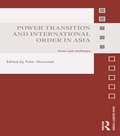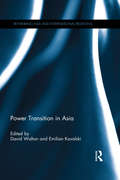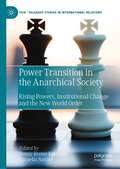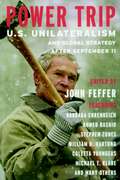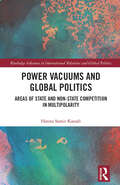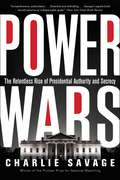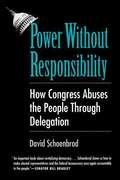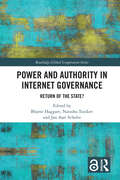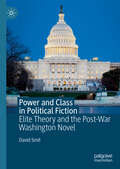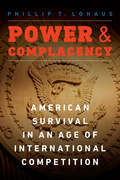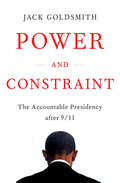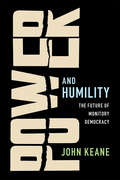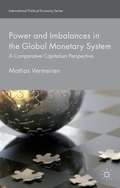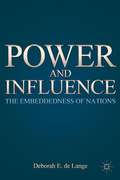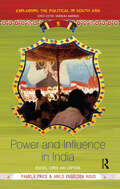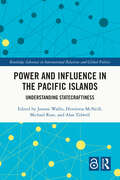- Table View
- List View
Power Transition and International Order in Asia: Issues and Challenges (Asian Security Studies)
by Peter ShearmanThis edited volume examines how the transition and diffusion of power in global politics is impacting on stability and order in Asia. Both in the academic field of International Relations (IR) and among policymakers, the big question today concerns the rise of China, the relative decline of the United States, and the increasing importance of Asia in global politics. The level of impact the international power transition will have in the region remains unclear, but observers agree that Asia is a potential tinderbox for crises and conflict. This volume brings together leading scholars from around the world to assess current thinking in IR on these issues. The authors apply appropriate theories and methods of analysis in their specific area of expertise to examine the likely effects of the changing global power distribution on Asia. There is also said to be an ongoing diffusion of power away from states to non-state actors in the region; hence, in addition to examining changing relations between the Great Powers, the book will also assess the implications that other actors, from terrorist groups, insurgents and organised crime syndicates, could have on stability and order. This book will be of much interest to students of Asian politics, security studies, diplomacy and international relations.
Power Transition in Asia (Rethinking Asia and International Relations)
by David Walton Emilian KavalskiCurrent preoccupations with the 'rise of Asia' attest to the nascent contestation of the very idea of what the pattern of international politics should look like and how it should be practiced. In this respect, the growing reference to a 'shift to the East' in global politics has become a popular shorthand for the nascent 'power transition' in world affairs. This volume offers a detailed conceptual and empirical investigation of the dynamics of power transition in Asia and details the accommodation strategies and coping mechanisms of different small and middle powers in Asia and, importantly, China's responses to these approaches.
Power Transition in the Anarchical Society: Rising Powers, Institutional Change and the New World Order (Palgrave Studies in International Relations)
by Cornelia Navari Tonny Brems KnudsenThis book examines the ongoing power transition and its ramifications for world order from an international society perspective. In that perspective, the outcome of big changes in the distribution of power is a matter of socialization rather than structural determination or the resilience of the so-called Liberal world order. Consequently, the key question of this book is how the ongoing power transition affects, and is affected by, the social institutions of world order including sovereignty, the balance of power, international law, diplomacy, trade, humanitarian intervention, national self-determination, and environmental stewardship. The guiding theoretical assumption of the book is that power transition stimulates fundamental institutional change rather than major conflict or a breakdown of international order, while international organizations are key arenas for the realization and negotiation of such changes, not the victims of hegemonic retreat. The argument is pursued in sections on rising and declining powers (Anglo-America, Russia, China and the EU, among others), consequences for the fundamental social institutions and changes in international organizations, globally and regionally. In combination, the chapters reveal the contours of the coming world order.
Power Trip: U.S. Unilateralism and Global Strategy after September 11
by John FefferA concise dissection of the new U.S. unilateralism, Power Trip is the first book-length critique of this fundamental shift in U.S. foreign policy to consolidate and extend U.S. global control. Charting the new terrain of foreign policy after September 11 and demonstrating how the Bush administration is building on the policies of its successors, here are Barbara Ehrenreich, William Hartung, Ahmed Rashid, Michael Ratner, Noy Thrupkaew, Coletta Youngers, Mark Weisbrot, and their contemporaries on the Bush administration and its flawed ambition to control the world.
Power Vacuums and Global Politics: Areas of State and Non-state Competition in Multipolarity (Routledge Advances in International Relations and Global Politics)
by Hanna Samir KassabIn this book, Hanna Samir Kassab develops a theoretical framework which explains the formulation of power vacuums and examines their impact on the international system. A power vacuum is the fundamental absence of legitimate state authority over a geographic territory, and it is a space free of governance. With no state authority governing a geographical region, opportunistic states and organized criminal and terrorist networks may attempt to control that space. Using a variety of historical examples and centering his analysis on ungoverned spaces rather than great powers, Kassab uncovers neglected areas of great power competition. Part One discusses State Actors specifically the strategic space of the Arctic, the Middle East and Africa, and Afghanistan and Central Asia. Part Two examines Non-State Actors such as terrorist networks, organized criminal networks, and the formulation of paramilitaries. Power Vacuums and Global Politics is the perfect volume for both undergraduate and graduate courses in international relations, security studies, political science, comparative politics, international political economy and war and peace.
Power Wars: The Relentless Rise of Presidential Authority and Secrecy
by Charlie SavagePulitzer Prize-winning journalist Charlie Savage's penetrating investigation of the Obama presidency and the national security stateBarack Obama campaigned on a promise of change from George W. Bush's "global war on terror." Yet from indefinite detention and drone strikes to surveillance and military tribunals, Obama ended up continuing-and in some cases expanding-many policies he inherited. What happened? In Power Wars, Charlie Savage looks inside the Obama administration's national security legal and policy team in a way that no one has before. Based on exclusive interviews with more than 150 current and former officials and access to previously unreported documents, he lays bare their internal deliberations, including emotional debates over the fates of detainees held on torture-tainted evidence and acts of war that lacked congressional authorization. He tells the inside stories of how Obama came to order the killing of an American citizen, preside over an unprecedented crackdown on leaks, and keep a then-secret National Security Agency program that collected records of every American's phone calls.Savage also pieces together the first comprehensive history of how American surveillance secretly developed over the past thirty-five years, synthesizing recent revelations and filling in gaps with new reporting. And he provides lucid explanations of legal dilemmas in a way that non-lawyers can understand. Highlighted by new information about the pivotal aftermath to the failed Christmas underwear bombing and the planning for the Osama bin Laden raid, Savage's own eyewitness reporting at Guantánamo, and detailed accounts of closed-door meetings at the highest levels of government, Power Wars equips readers to understand the legacy of Obama's presidency.
Power after Carbon: Building a Clean, Resilient Grid
by Peter Fox-PennerAs the electric power industry faces the challenges of climate change, technological disruption, new market imperatives, and changing policies, a renowned energy expert offers a roadmap to the future of this essential sector. As the damaging and costly impacts of climate change increase, the rapid development of sustainable energy has taken on great urgency. The electricity industry has responded with necessary but wrenching shifts toward renewables, even as it faces unprecedented challenges and disruption brought on by new technologies, new competitors, and policy changes. The result is a collision course between a grid that must provide abundant, secure, flexible, and affordable power, and an industry facing enormous demands for power and rapid, systemic change. The fashionable solution is to think small: smart buildings, small-scale renewables, and locally distributed green energy. But Peter Fox-Penner makes clear that these will not be enough to meet our increasing needs for electricity. He points instead to the indispensability of large power systems, battery storage, and scalable carbon-free power technologies, along with the grids and markets that will integrate them. The electric power industry and its regulators will have to provide all of these, even as they grapple with changing business models for local electric utilities, political instability, and technological change. Power after Carbon makes sense of all the moving parts, providing actionable recommendations for anyone involved with or relying on the electric power system.
Power and Authority in Internet Governance: Return of the State? (ISSN)
by Jan Aart Scholte Blayne Haggart Natasha TusikovPower and Authority in Internet Governance investigates the hotly contested role of the state in today's digital society. The book asks: Is the state "back" in internet regulation? If so, what forms are state involvement taking, and with what consequences for the future?The volume includes case studies from across the world and addresses a wide range of issues regarding internet infrastructure, data and content. The book pushes the debate beyond a simplistic dichotomy between liberalism and authoritarianism in order to consider also greater state involvement based on values of democracy and human rights. Seeing internet governance as a complex arena where power is contested among diverse non-state and state actors across local, national, regional and global scales, the book offers a critical and nuanced discussion of how the internet is governed – and how it should be governed.Power and Authority in Internet Governance provides an important resource for researchers across international relations, global governance, science and technology studies and law as well as policymakers and analysts concerned with regulating the global internet.The Open Access version of this book, available at http://www.taylorfrancis.com, has been made available under a Creative Commons Attribution-Non Commercial-No Derivatives (CC-BY-ND) 4.0 license.
Power and Authority in Internet Governance: Return of the State? (Routledge Global Cooperation Series)
by Jan Aart Scholte Blayne Haggart Natasha TusikovPower and Authority in Internet Governance investigates the hotly contested role of the state in today's digital society. The book asks: Is the state "back" in internet regulation? If so, what forms are state involvement taking, and with what consequences for the future? The volume includes case studies from across the world and addresses a wide range of issues regarding internet infrastructure, data and content. The book pushes the debate beyond a simplistic dichotomy between liberalism and authoritarianism in order to consider also greater state involvement based on values of democracy and human rights. Seeing internet governance as a complex arena where power is contested among diverse non-state and state actors across local, national, regional and global scales, the book offers a critical and nuanced discussion of how the internet is governed – and how it should be governed. Power and Authority in Internet Governance provides an important resource for researchers across international relations, global governance, science and technology studies and law as well as policymakers and analysts concerned with regulating the global internet.
Power and Change in Iran: Politics of Contention and Conciliation
by Daniel Brumberg and Farideh Farhi“By a wide margin, this book is the most sophisticated treatment of the internal dynamics and paradoxes of Iranian politics that I know of.” —Nader Hashemi, Director of the Center for Middle East StudiesThis volume provides an unparalleled and timely look at political, social, economic, and ideological dynamics in contemporary Iran. Through chapters on social welfare and privatization, university education, the role and authority of the Supreme Leader, the rule of law, the evolving electoral system, and the intense debate over human rights within and outside the regime, the contributors offer a comprehensive overview of Iranian politics. Their case studies reveal a society whose multiple vectors of contestation, negotiation, and competition are creating possibilities for transformation that are yet to be realized but whose outcome will affect the Islamic Republic, the region, and relations with the United States.“Offers a realistic, nuanced, and perceptive analysis of Iran’s complex and evolving political system . . . This book would be appropriate as required or recommended reading for any courses dealing with the Islamic Republic of Iran or with the politics of the Middle East, both at the undergraduate and graduate levels.” —Mohsen Milani, author of The Making of Iran’s Islamic Revolution
Power and Class in Political Fiction: Elite Theory and the Post-War Washington Novel
by David SmitThis book introduces Elite Theory to the literary study of class as a framework for addressing issues of the nature of governance in political fiction. The book describes the historical development and major tenets of Elite Theory, and shows how each of four post-war Washington novels—Gore Vidal’s Washington, D.C.; Allen Drury’s Advise and Consent; Joan Didion’s Democracy; and Ward Just’s Echo House—illustrates the way class-based political elites exhibit forms of “ruling-class consciousness” and maintain their legitimacy in an ostensibly democratic form of government by promoting themselves as models of behavior, promulgating an ideology that justifies their rule through their control of the media, and accepting new members from the lower classes. Reading these novels through a socio-political lens, David Smit offers suggestions for ways to work for a more just and equitable society in light of what this analysis reveals about the “culture” that produces our political elites.
Power and Complacency: American Survival in an Age of International Competition
by Phillip T. LohausThe United States is at a crossroads. Despite a defense budget that dwarfs that of any of the nation&’s rivals, the marginal return on this investment has decreased dramatically since the end of World War II. Why? Why have America&’s rivals, despite inferior resources, increasingly set the terms of international competition? How might America&’s leaders reconsider the application of power to ensure a favorable place on an increasingly crowded global stage? By tracing the geographic and historical development of four global actors—Russia, Iran, China, and the United States—Phillip T. Lohaus illuminates four equally distinct approaches to competition outside of warfare. He argues that while America&’s actions may have birthed information as a currency of power, the nation&’s failure to fully grasp the implications of this transition has created critical opportunities for its rivals to increase their power at the expense of the United States. The American way of competition, rooted in a scientific understanding of warfare, may impede effectiveness in the amorphous and unscientific landscape of twenty-first-century competition. From Rome to Britain, complacency has contributed to the downfall of many empires. Yet the slow bleed of American power may still be stanched by an approach to competition that emphasizes subtlety, diffusion, and ubiquity. America has developed and used these tools in the past—its very survival may hinge on returning to them. Power and Complacency defines the differing perspectives of America&’s international conflicts and offers possible solutions for reformulating its superpower strengths.
Power and Constraint: The Accountable Presidency After 9/11
by Jack GoldsmithThe surprising truth behind Barack Obama's decision to continue many of his predecessor's counterterrorism policies. Conventional wisdom holds that 9/11 sounded the death knell for presidential accountability. In fact, the opposite is true. The novel powers that our post-9/11 commanders in chief assumed--endless detentions, military commissions, state secrets, broad surveillance, and more--are the culmination of a two-century expansion of presidential authority. But these new powers have been met with thousands of barely visible legal and political constraints--enforced by congressional committees, government lawyers, courts, and the media--that have transformed our unprecedentedly powerful presidency into one that is also unprecedentedly accountable. These constraints are the key to understanding why Obama continued the Bush counterterrorism program, and in this light, the events of the last decade should be seen as a victory, not a failure, of American constitutional government. We have actually preserved the framers' original idea of a balanced constitution, despite the vast increase in presidential power made necessary by this age of permanent emergency.
Power and Education: Contexts of Oppression and Opportunity
by Antonia KupferEducation is a crucial influence early in life and is therefore inextricably linked with power. This book examines how education can limit opportunities and create social inequality as well as being an empowering force for good. Theoretical approaches on the relationship of power and education are discussed as are questions on power and knowledge.
Power and Global Economic Institutions
by Ayse KayaWhat is the relationship between states' economic power and their formal political power in multilateral economic institutions? Why do we see variation in states' formal political power across economic institutions of the same era? In this book, Ayse Kaya examines these crucial under-explored questions, drawing on multiple theoretical traditions within international relations to advance a new approach of 'adjusted power'. She explains how the economic shifts of our time, marked by the rise of Brazil, Russia, India, China and other emerging economies, have affected and will impact key multilateral economic institutions. Through detailed contemporary and historical analyses of the International Monetary Fund, the World Bank, the G20, and the International Trade Organization, Kaya shows that the institutional setting mediates the significance of the underlying distribution of economic power across states. The book presents both case studies and key statistics.
Power and Glory: Elizabeth II and the Rebirth of Royalty
by Alexander LarmanPower and Glory brings us to the dramatic conclusion of Larman's 'Windsors trilogy'.It begins with the fallout from the revelation of the Duke of Windsor's wartime treachery, and ends with the Coronation of Elizabeth II on 2 June 1953. In between, it depicts a monarchy - and a country - struggling to cope with the aftermath of World War Two, in an era where old certainties have been replaced by the rise of a new, uncertain world, and where love, tragedy and modernity battle for supremacy.The book draws on extensive unpublished correspondence between major members of the Royal Family including George VI, Princess Elizabeth and the Duke of Windsor, the Prime Ministers Clement Attlee and Winston Churchill, and previously unseen diaries and memoranda from courtiers, personal secretaries and leading politicians, exploring everything from the King's declining health to the (often negative) reactions to Elizabeth's marriage to Prince Philip and Coronation.Power and Glory features the same intricately researched and incisively written account of Britain's most famous family as Larman's previous books, but on an epic international scale. It covers everything from the end of British rule in India to the foundation of the United Nations, and the crucial role that monarchy played in the ever-shifting era - as well, naturally, as the way in which the Duke and Duchess of Windsor attempted to return to relevance, whatever the cost might be to the wider Royal Family.
Power and Glory: Elizabeth II and the Rebirth of Royalty
by Alexander LarmanPower and Glory brings us to the dramatic conclusion of Larman's 'Windsors trilogy'.It begins with the fallout from the revelation of the Duke of Windsor's wartime treachery, and ends with the Coronation of Elizabeth II on 2 June 1953. In between, it depicts a monarchy - and a country - struggling to cope with the aftermath of World War Two, in an era where old certainties have been replaced by the rise of a new, uncertain world, and where love, tragedy and modernity battle for supremacy.The book draws on extensive unpublished correspondence between major members of the Royal Family including George VI, Princess Elizabeth and the Duke of Windsor, the Prime Ministers Clement Attlee and Winston Churchill, and previously unseen diaries and memoranda from courtiers, personal secretaries and leading politicians, exploring everything from the King's declining health to the (often negative) reactions to Elizabeth's marriage to Prince Philip and Coronation.Power and Glory features the same intricately researched and incisively written account of Britain's most famous family as Larman's previous books, but on an epic international scale. It covers everything from the end of British rule in India to the foundation of the United Nations, and the crucial role that monarchy played in the ever-shifting era - as well, naturally, as the way in which the Duke and Duchess of Windsor attempted to return to relevance, whatever the cost might be to the wider Royal Family.
Power and Glory: Elizabeth II and the Rebirth of Royalty
by Alexander LarmanAlexander Larman, the master chronicler of the House of Windsor, brings his acclaimed trilogy to a dramatic and poignant conclusion.When the Royal Family took to the balcony of Buckingham Palace on VE Day in 1945, they knew that the happiness and excitement of the day was illusory. Britain may have been victorious in a painful war, but the peace would be no easier. Between the abdication crisis, the death of King George VI, and the ascension of young Elizabeth II to the throne, the continued existence of the monarchy seemed uncertain. And the presence of the former Edward VIII, now the Duke of Windsor, conniving and sniping from the sidelines in an attempt to regain relevance, even down to writing a controversial and revelatory memoir, could only make matters worse. Still, the question of whether or not Elizabeth could succeed and make the monarchy something that once again inspired international pride and even love remained.In Power and Glory, Alexander Larman completes his acclaimed Windsor family trilogy, using rare and previously unseen documents to illuminate their unique family dynamic. Through his chronicling of events like the Royal Wedding, George VI’s death and the discovery of the Duke of Windsor’s treacherous activities in WWII, Larman paints a vivid portrait of the end of one sovereign’s reign and the beginning of another’s that heralded a new Elizabethan Age which would bring power and glory back to a monarchy desperately in need of it.
Power and Governance in a Partially Globalized World
by Robert KeohaneAs one of the most innovative and influential thinkers in international relations for more than three decades, Robert O. Keohane's groundbreaking work in institutional theory has redefined our understanding of international political economy. Consisting of a selection of his most recent essays, this absorbing book address such core issues as interdependence, institutions, the development of international law, globalization and global governance. The essays are placed in historical and intellectual context by a substantial new introduction outlining the developments in Keohane's thought, and in an original afterword, the author offers a challenging interpretation of the September 11th attacks and their aftermath. Undoubtedly, this book is essential reading for anyone with an interest in international relations.
Power and Humility: The Future of Monitory Democracy
by John KeaneDemocracy urgently needs re-imagining if it is to address the dangers and opportunities posed by current global realities, argues leading political thinker John Keane. He offers an imaginative, radically new interpretation of the twenty-first-century fate of democracy. The book shows why the current literature on democracy is failing to make sense of many intellectual puzzles and new political trends. It probes a wide range of themes, from the growth of cross-border institutions and capitalist market failures to the greening of democracy, the dignity of children and the anti-democratic effects of everyday fear, violence and bigotry. Keane develops the idea of 'monitory democracy' to show why periodic free and fair elections are losing their democratic centrality; and why the ongoing struggles by citizens and their representatives, in a multiplicity of global settings, to humble the high and mighty and deal with the dangers of arbitrary power, force us to rethink what we mean by democracy and why it remains a universal ideal.
Power and Imbalances in the Global Monetary System
by Mattias VermeirenThe author examines the indirect macroeconomic roots of the global financial crisis and Eurozone debt crisis: the escalation of global trade imbalances between the US and China and regional trade imbalances in the Eurozone. He provides new insights into the sources and dynamics of power and instability in the contemporary global monetary system
Power and Influence
by Deborah E. De LangeThis book investigates whether and why social structure influences cooperative organizational strategic decision making in an international relations context. It looks in particular at the United Nations General Assembly (UNGA).
Power and Influence in India: Bosses, Lords and Captains (Exploring the Political in South Asia)
by Pamela Price Arild Engelsen RuudTaking cognisance of the lack of studies on leadership in modern India, this book explores how leadership is practiced in the Indian context, examining this across varied domains — from rural settings and urban neighbourhoods to political parties and state governments. The importance of individual leaders in the projection of politics in South Asia is evident from how political parties, mobilisation of movements and the media all focus on carefully constructed personalities. Besides, the politically ambitious have considerable room for manoeuvre in the institutional setup of the Indian subcontinent. This book focuses on actors making their political career and/or aspiring for leadership roles, even as it also foregrounds the range of choices open to them in particular contexts. The articles in this volume explore the variety of strategies used by politically engaged actors in trying to acquire (or keep) power — symbolic action, rhetorical usage, moral conviction, building of alliances — illustrating, in the process, both the opportunities and constraints experienced by them. In taking a qualitative approach and tracking both political styles and transactions, this book provides insights into the nature of democracy and the functioning of electoral politics in the subcontinent.
Power and Influence in the Pacific Islands: Understanding Statecraftiness (Routledge Advances in International Relations and Global Politics)
by Michael Rose Joanne Wallis Henrietta McNeill Alan TidwellThis book outlines an analytical framework to understand power, influence, and statecraft in the Pacific Islands region. With contributions by scholars from the United States, Australia, China, New Zealand, and across the Pacific Islands region, it provides ‘both sides of the story’ of statecraft and explores how power and influence are being exercised in the Pacific Islands. Amid escalating strategic competition, the United States, China, Australia, and a range of other partners are trying to exercise power and influence in their Pacific Islands region through their statecraft. But which partners are doing what, where are they doing it, and how are Pacific Island countries and people responding? Through case studies of key examples – such as economic assistance, defence diplomacy, scholarships, and strategic narratives – this book analyses how tools of statecraft are being deployed by a range of key partners and Pacific Island states, and how they are being received by Pacific Island countries and people.A vital resource for scholars and practitioners in International Relations and diplomacy as well as those seeking to understand how statecraft, power, and influence are being exercised in the Pacific Islands region.The Open Access version of this book, available at http://www.taylorfrancis.com, has been made available under a Creative Commons [Attribution-Non Commercial-No Derivatives (CC-BY-NC-ND)] 4.0 license.
